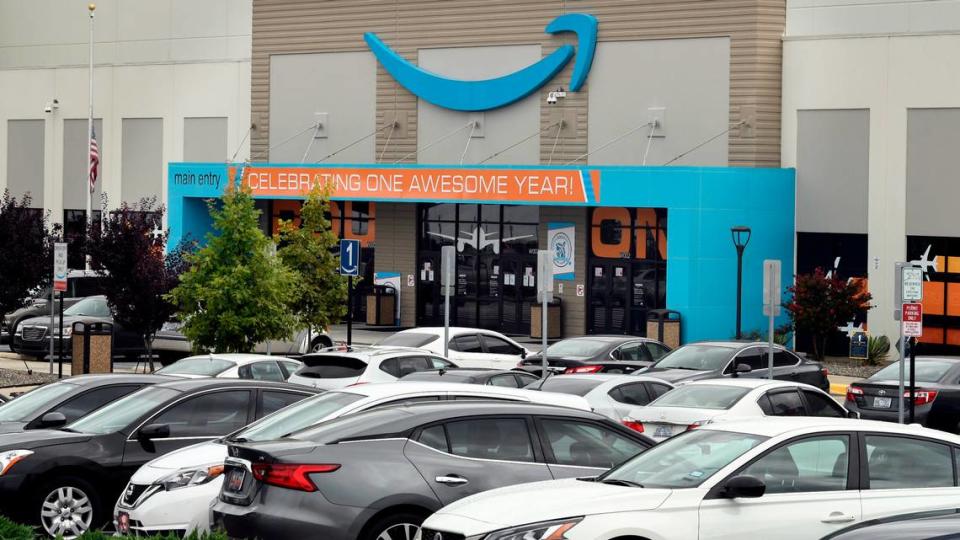Fired Amazon worker in Raleigh charges ex-employer with disability discrimination
A Raleigh woman has accused Amazon of disability-based discrimination, alleging the company failed to provide her an American Sign Language interpreter during onboarding training and later fired her while she was on involuntary medical leave from the massive fulfillment center in Garner.
Last month, the advocacy group Disability Rights North Carolina submitted a discrimination charge to the U.S. Equal Employment Opportunity Commission on behalf of the terminated employee, 35-year-old MarQuetta Holdbrooks.
According to the filing, Holdbrooks transferred to the Garner facility in October from an Amazon site in Morrisville. She was informed additional training would be required as a fulfillment associate at the new warehouse, and Holdbrooks, who is hearing impaired, said she requested an interpreter to help her understand the instructions.
She still had not received this accommodation when, on Nov. 10, Holdbrooks was allegedly “ordered home immediately.”
This unrequested medical leave ended around 10 days later when Amazon fired Holdbrooks “without cause,” the charge states. These events constituted a violation of the Americans with Disabilities Act, says Lena Welch, an attorney with the Disability Rights North Carolina, which is the state-designated protection and advocacy group in North Carolina.
“The discrimination she experienced was so blatant,” Welch said in a phone interview this week. “Also, we know that Amazon is a really big employer who employs a lot of people with disabilities. So, we think this case is really important.”
Amazon is the second-largest private employer in the United States, behind Walmart, and state commerce records show the tech giant is also the biggest private employer in Wake County. The Garner warehouse is the reason why. Opened in 2020, the sprawling RDU1 facility south of Raleigh has four floors and supports roughly 5,000 workers whose shifts collectively span all hours of the day and night.
In an email Wednesday to The News & Observer, Amazon spokesperson Sam Stephenson said the company is reviewing the case and that “every accommodation request is carefully considered on a case by case basis, including assisting those who use American Sign Language.”
Signed in 1990, the Americans with Disabilities Act aims to assure greater participation in society by those with disabilities. Title 1 of the ADA applies to the workplace and requires employers with 15 or more workers to provide “reasonable accommodations” to qualified staff. Employers may be exempt from doing so if they can prove providing accommodations would present “undue hardship” on operations.
Welch recommended employers who seek staff accommodations visit the Job Accommodations Network website.
What comes after an EEOC charge?
Once the government receives a charge of discrimination, it must notify the employer within 10 days. At times, the EEOC will offer employers and employees mediation to resolve issues more quickly. Otherwise, the agency asks the employer for a statement and assigns an investigator. There is no time limit for when investigations must conclude.
Last year, the EEOC received 1,370 disability discrimination charges from North Carolina, agency data shows. The only protected category with more charges in the state was race-based discrimination. Nationally, approximately 60% of ADA-based charges were resolved with “no reasonable cause” found against the employer.

If discrimination is found however, the government will try to reach a solution with the employer. Potential remedies include financial damages, reinstatement or promotions. If employees agree to the remedy, they then waive their right to sue.
But if an agreement cannot be reached, the EEOC may bring the case to court. “Because of limited resources, we cannot file a lawsuit in every case where we find discrimination,” the agency states on its website. In these situations, affected employees have 90 days from the close of the case to file their own lawsuit.
Last year, the government brought 49 total cases under ADA claims. Recent notable disability discrimination settlements include FedEx paying $3.3 million in 2020 and Walmart paying $419,000 in 2022. Each of these cases took multiple years to conclude.


